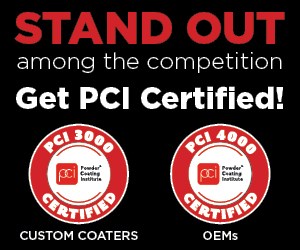Water Conductivity
What is the effect of water conductivity on the pretreatment process and final powder coating? Will it affect the corrosion resistance and salt spray results?
Q. What is the effect of water conductivity on the pretreatment process and final powder coating? Will it affect the corrosion resistance and salt spray results? P.Z.
A. Yes. Rinsewater quality is an important part of the pretreatment process. In between stages, it is important to remove residual chemistry before entering the next stage. But it is the final rinse that is most critical.
If the last stage has high conductivity, it may not do an adequate job of rinsing the part. If mineral salts are left on the part surface, they can start corrosion cells and lead to premature failure of the coating. If corrosion resistance is important to you, the final rinsewater should be low.
The ideal condition is to use recirculated rinsewater in the last stage that does not exceed around 180 mS/cm (micro-Siemens/centimeter) and follow that up with a pure water halo rinse in the exit vestibule of the washer that is below 10 mS/cm. If you measure water quality in TDS (total dissolved solids), the equivalent quality is around 300 PPM (parts per million) in the final recirculated rinse and 15 PPM for the halo.
Related Content
-
An Altruistic Growth Strategy Puts People First
Professional Plating emphasizes investing in its team and fostering a supportive environment on the shop floor.
-
Adjusting Current and Voltage When Powder Coating
Which manual powder coating gun setting is better to adjust, voltage or current? Jeff Hale of Gema USA discusses when to use different settings on your powder gun to achieve optimal results.
-
Calculating the Cost of Powder Coating
How can you calculate the cost of powder coating a component if you only know its surface area? Powder coating expert Rodger Talbert has the answer.
















